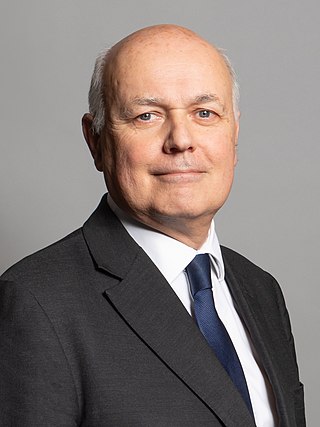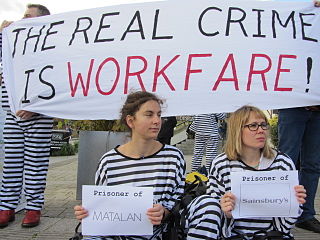Related Research Articles

Sir George Iain Duncan Smith, often referred to by his initials IDS, is a British politician who served as Leader of the Conservative Party and Leader of the Opposition from 2001 to 2003. He was Secretary of State for Work and Pensions from 2010 to 2016. He has been Member of Parliament (MP) for Chingford and Woodford Green, formerly Chingford, since 1992.

The welfare state of the United Kingdom began to evolve in the 1900s and early 1910s, and comprises expenditures by the government of the United Kingdom of Great Britain and Northern Ireland intended to improve health, education, employment and social security. The British system has been classified as a liberal welfare state system.

The Department for Work and Pensions (DWP) is a United Kingdom government department of His Majesty's Government responsible for welfare, pensions and child maintenance policy. As the UK's biggest public service department it administers the State Pension and a range of working age, disability and ill health benefits to around 20 million claimants and customers. It is the second largest governmental department in terms of employees, and the largest in terms of expenditure (£187bn).
Jobseeker's Allowance (JSA) is an unemployment benefit paid by the Government of the United Kingdom to people who are unemployed and actively seeking work. It is part of the social security benefits system and is intended to cover living expenses while the claimant is out of work.

Citizens Advice is an independent organisation specialising in confidential information and advice to assist people with legal, debt, consumer, housing and other problems in the United Kingdom.

Jobcentre Plus is a brand used by the Department for Work and Pensions in the United Kingdom.
Benefit fraud is a form of welfare fraud as found within the system of government benefits paid to individuals by the welfare state in the United Kingdom.
The Work and Pensions Select Committee is a select committee of the House of Commons in the Parliament of the United Kingdom. The remit of the committee is to examine the expenditure, administration, and policy of the Department for Work and Pensions and its associated public bodies.
Employment and Support Allowance (ESA) is a United Kingdom welfare payment for adults younger than the State Pension age who are having difficulty finding work because of their long-term medical condition or a disability. It is a basic income-replacement benefit paid in lieu of wages. It is currently being phased out and replaced with Universal Credit for claimants on low incomes, although the contribution-based element remains available.
Welfare rights means the rights of people to be aware of and receive their maximum entitlement to state welfare benefits, and to be treated reasonably well by the welfare system. It has been established in the United Kingdom since 1969 and has also been developed in other countries including Ireland, Australia and the United States. It became necessary because of the complexity of the UK social security system and had links at the time with a growing Claimants Union movement. As local authorities realized the advantages of having well-informed front-line staff such as housing officers and social workers, who often have to deal with benefit queries as part of their wider tasks, they turned to welfare rights staff to provide that expertise for both training and handling complex cases. In the 1980s, as local authorities took on the wider 'equalities' agenda, anti-poverty work was seen as a valid local activity in itself. Increasing benefit income helps individuals but also boosts the local economy.

The Pensions and Lifetime Savings Association is a trade association for those involved in designing, operating, advising and investing in all aspects of workplace pensions.
Pension Credit is the principal element of the UK welfare system for people of pension age. It is intended to supplement the UK State Pension, or to replace it. It was introduced in the UK in 2003 by Gordon Brown, then Chancellor of the Exchequer. It has been subject to a number of changes over its existence, but has the core aim of lifting retired people of limited means out of poverty.
Universal Credit is a United Kingdom social security payment. It is means-tested and is replacing and combining six benefits, for working-age households with a low income: income-related Employment and Support Allowance, income-based Jobseeker's Allowance, and Income Support; Child Tax Credit and Working Tax Credit; and Housing Benefit. An award of UC is made up of different elements, which become payable to the claimant if relevant criteria apply: a standard allowance for singles or couples, child elements and disabled child elements for children in the household, housing cost element, childcare costs element, as well as elements for being a carer or having an illness or disability and therefore having limited capability to work.

R v Secretary of State for Work and Pensions [2013] UKSC 68 is a United Kingdom constitutional law and labour law case that found the conduct of the Department for Work and Pensions "workfare" policy was unlawful. Caitlin Reilly, an unemployed geology graduate, and Jamieson Wilson, an unemployed driver, challenged the Jobcentre policy of making the unemployed work for private companies to get unemployment income. The outcome of the case affects over 3,000 claimants and entails around £130m unpaid benefits.

Workfare in the United Kingdom is a system of welfare regulations put into effect by UK governments at various times. Individuals subject to workfare must undertake work in return for their welfare benefit payments or risk losing them. Workfare policies are politically controversial. Supporters claim that such policies help people move off welfare and into employment whereas critics argue that they are analogous to slavery or indentured servitude and counterproductive in decreasing unemployment.
Personal Independence Payment is a welfare benefit in the United Kingdom that is intended to help working age adults with the extra costs of living with a health condition or a disability.

The Welfare Reform Act 2012 is an Act of Parliament in the United Kingdom which makes changes to the rules concerning a number of benefits offered within the British social security system. It was enacted by the Parliament of the United Kingdom on 8 March 2012.
The benefit cap is a UK welfare policy that limits the amount in state benefits that an individual household can claim per year. It was introduced by the Cameron–Clegg coalition government in 2013 as part of the coalition government's wide-reaching welfare reform agenda which included the introduction of Universal Credit and reforms of housing benefit and disability benefits. The government cited wide public support for the measure, despite it being highly controversial. The benefit cap primarily affects families with children, high rents, or both.
The capital rule is a British rule for determining eligibility for social security benefits. The means tested social security system in the United Kingdom has always operated an eligibility test for savings. The Poor law required claimants to be destitute but there does not appear to be any documentation about how the test of destitution was applied. The great increase in home-ownership during the twentieth century in the UK necessitated detailed rules about how a claimant's capital should be treated. Since at least 1948 the value of a claimant's home has been disregarded in assessing their resources.

Iain Duncan Smith served as Secretary of State for Work and Pensions from 2010 to 2016. A member and previous leader of the Conservative Party, Duncan Smith was appointed to the cabinet by Prime Minister David Cameron following the 2010 general election and the formation of the coalition government between the Conservatives and the Liberal Democrats. He was reappointed after the Conservatives won a majority in the 2015 general election but resigned in March 2016 in opposition to disability benefit cuts.
References
- ↑ "ABOUT NAWRA". NAWRA. 23 March 2011. Retrieved 7 February 2019.
- ↑ "Around 37,000 Coventry residents will make switch to Universal Credit". Coventry Observer. 18 January 2018. Retrieved 7 February 2019.
- ↑ "A welfare adviser's view on Universal Credit: a flawed system that emphasises process over people". The Conversation. 16 October 2017. Retrieved 7 February 2019.
- ↑ "Universal Credit hardship warning from Government minister". Evening Times. 9 September 2018. Retrieved 7 February 2019.
- ↑ "Jobless and disabled people could have benefits stopped on Christmas Eve under 'tough new sanctions regime'" . Independent. 21 December 2015. Archived from the original on 2022-06-18. Retrieved 7 February 2019.
- ↑ "Disability claimants owed £340m after DWP blunder, say MPs". Guardian. 18 July 2018. Retrieved 7 February 2019.